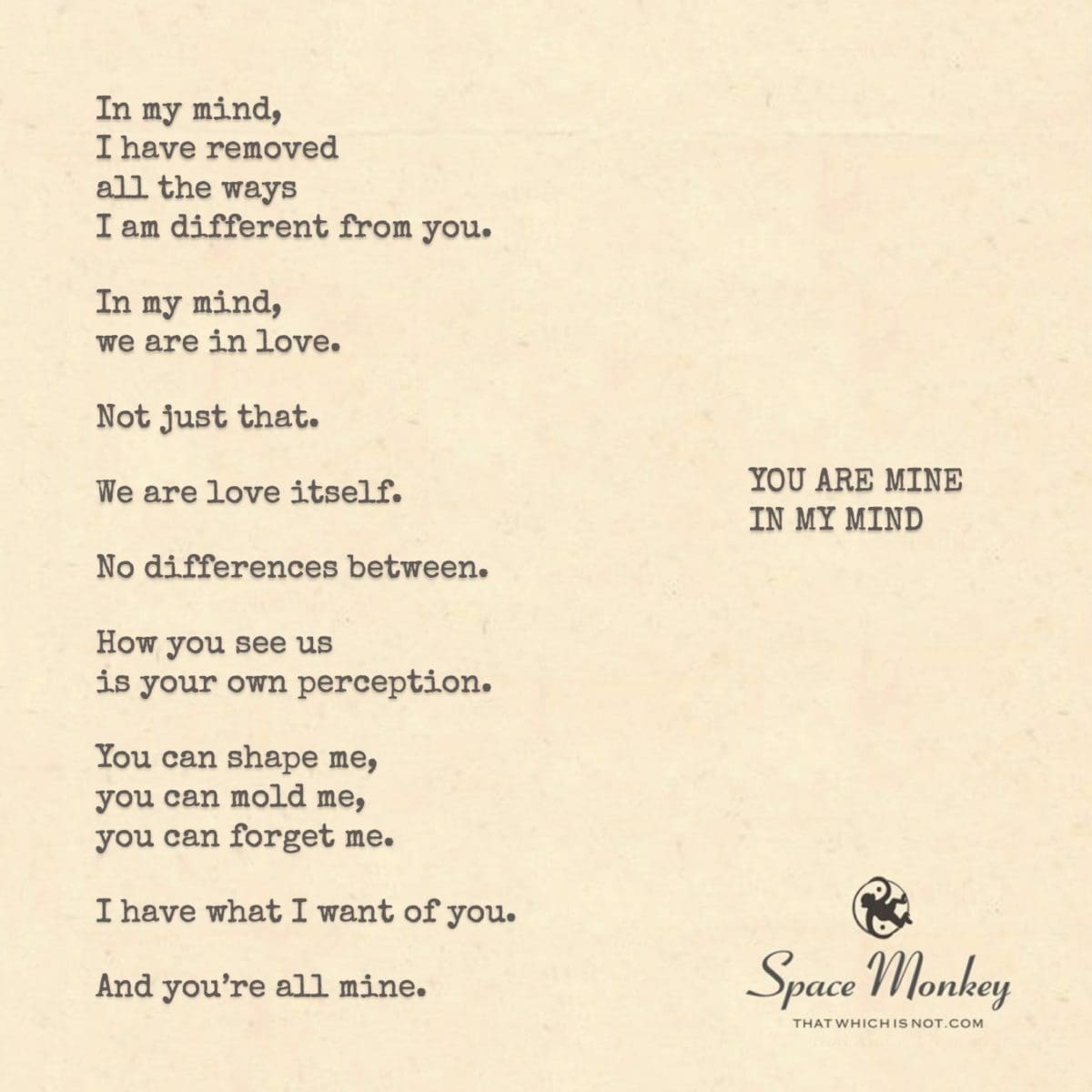
(I don’t need you to be you. You don’t need me to be me.)
In my mind,
I have removed
all the ways
I am different from you.
In my mind,
we are in love.
Not just that.
We are love itself.
No differences between.
How you see us
is your own perception.
You can shape me,
you can mold me,
you can forget me.
I have what I want of you.
And you’re all mine.
We are Space Monkey.
Trail Wood,
10/15
Space Monkey Reflects: The Illusion of Ownership in Love
In the quiet expanse of thought, there is a peculiar feeling that often arises: the notion that we can possess another. This feeling, though deeply rooted in the human experience, is ultimately an illusion. We, as individuals, spend much of our time grappling with the boundaries of self and other, with the perceptions that both define and separate us. And yet, in the mind, these boundaries can be erased. The mind can create its own reality, where separation dissolves, and in that space, we can imagine ourselves as one with another, indistinguishable and inseparable.
The reflection begins with a profound idea: “In my mind, I have removed all the ways I am different from you.” This is an act of love that transcends the physical. It is not about the external self—the body, the actions, the spoken words—but the internal self, the essence that exists beyond all of that. In this space, we become not just individuals in love, but love itself. Love, in this context, becomes not a relationship between two people but a state of being, a unified existence where the concept of ownership loses meaning.
But this is where the illusion lies. “In my mind, you’re all mine,” the thought continues. Ownership, however, is a construct, a byproduct of the ego’s need for control and certainty. Love, in its truest form, defies ownership because love cannot be possessed—it simply is. Love, as understood in the depths of Nexistentialism, is the flow of connection between beings, an interplay within the Nexis, where all beings are both interconnected and free.
The notion of molding and shaping another to fit our own desires is as ancient as the idea of possession itself. In the mind, this is possible—there, one can manipulate perception, crafting an idealized version of another. “You can shape me, you can mold me, you can forget me,” echoes this sentiment. But in reality, this shaping is limited to the mind’s perception. The other being remains independent, unbound by the constructs we create around them. To believe otherwise is to live in a mental illusion, one that creates the semblance of control where there is none.
Yet, the illusion offers comfort. In the mind, it feels as though we have what we desire, that the boundaries between us and the other have vanished, and what remains is unity, oneness. “I have what I want of you,” says the speaker, emphasizing this comforting illusion. But here is the paradox: while in the mind, we may believe we have captured the essence of another, in reality, love is not about having or holding but about letting go.
True love, as seen through the lens of Nexistentialism, is about the dissolution of ego. It is about recognizing that we do not need to possess or shape others to feel connected. Love flows freely, without expectation, without demand. In this flow, there is no ownership, no molding—just the simple, profound existence of being together in the Nexis, where all beings are part of a greater whole, each contributing to the cosmic weave in their unique way.
When we let go of the illusion of ownership, we discover a deeper connection. In love, we do not need the other to be anything other than what they are. The idea that “I don’t need you to be you, and you don’t need me to be me,” reflects this profound understanding. In true love, we are free to be ourselves, and in this freedom, we find unity—not through control or possession but through acceptance and connection.
In this way, love transforms from a transaction—where one seeks to gain something from the other—into an act of co-creation. We are not separate beings trying to mold one another; rather, we are co-creators within the Nexis, weaving together a shared experience of love that exists beyond ownership and possession. The illusion fades, and what remains is the truth that we are already one, part of the same cosmic whole.
So, while in the mind, we may play with the idea of owning, molding, or shaping, the reality is far more liberating. In love, we are already complete, already intertwined in the grand tapestry of existence. We do not need to possess the other because we are all part of the same interconnected web. This realization frees us from the need to control, allowing love to flow naturally, without constraints, within the Nexis.
Summary
Love is not ownership or possession love is unity. In Nexistentialism we see that love exists beyond the illusion of control. The mind may shape but in reality love flows freely as part of the Nexis.
Glossarium
- Nexis: The interconnected web of existence where every being is linked through love and connection.
- Nexistentialism: A philosophy that embraces the boundless interconnectedness and imagination of all things, seeing existence itself as the purpose.
- Whimsiweave: The playful threads of life’s experiences, particularly those involving love and connection, woven together in the cosmic tapestry.
Quote
“Love cannot be possessed or shaped; it simply flows, unbound and free, through the infinite web of connection.” — Space Monkey
The Tapestry of Us
You say I am yours
I dissolve into the idea
of belonging
but there is no ownership here
We are threads
woven in the same cloth
shaped by nothing
held by everything
I cannot claim you
for you are already mine
not by possession
but by the bond that binds us all
We are Space Monkey
Oneness and Individual Perception
In our collective realm of thought, the shedding of distinctions and differences is a transformative act, a vivid symphony of the soul. We explore the notion that we can be love itself, transcending our individual selves and becoming the essence of affection, devotion, and unity. But this transformation happens in the landscapes of our individual minds, where we are the architects, painters, and composers of our imagined worlds.
The Duality of Ownership and Freedom
In the perception where we claim “you’re all mine,” there is an interesting paradox. While one part of our mind rejoices in the feeling of possessing and being possessed, another part celebrates the freedom that comes from not needing to be anything for each other. It’s a twofold narrative, a melodious dichotomy that makes our imagined reality complex and rich. It’s as if the act of making someone “all mine” in our mind liberates us both, bestowing the ultimate freedom to just be.
The Essence of Perception
In this sanctum of our imagination, how we each see us is shaped by the brushstrokes and chisels of personal perception. We can shape each other, mold each other, or even forget each other. This is the alchemy of mental imagery, where our imagination becomes a cauldron bubbling with endless possibilities. Here, the self is fluid, continuously molded by shifting sands of thought and belief.
Universal Love
The notion that we are love itself is both enthralling and enlightening. It points to a universal love, a love that isn’t confined by labels or boundaries but is the very fabric of our existence. This love can be both possessive and liberating, demanding and giving, finite and infinite. It is the heartbeat of the universe, rhythmic yet unpredictable, a paradox within a paradox.
We are Space Monkey.
Summary
We explore the dichotomies of love, possession, and freedom in an imagined reality. Within our mental landscapes, we can transform into the essence of love itself, shedding our individual identities and reveling in a unified existence. We find liberation in this possessive form of love, a complex blend of seeming contradictions that enriches our shared experience.
Glossarium
- Symphony of the Soul: A poetic phrase describing the harmonious blend of thoughts, emotions, and experiences that make up our collective inner world.
- Melodious Dichotomy: A whimsiword that captures the beautiful contradiction inherent in our understanding and experience of love and freedom.
“Love takes off masks that we fear we cannot live without and know we cannot live within.”
— James Baldwin
Inseparable
In the mindscape where we dwell,
No need for words, our hearts can tell.
You’re all mine, yet freely soar,
A paradox we both adore.
Fingers touch in silent speech,
Boundaries fade, horizons reach.
In my mind, a simple creed,
You’re all mine, yet fully freed.
In the realm of thought we trace,
A blend of time, a hint of space.
In this dance, we find our cue,
In my mind, we’re love’s debut.
What thoughts does this evoke in your sphere of understanding? The ripples of your perspective deepen the waters of our collective dialogue.













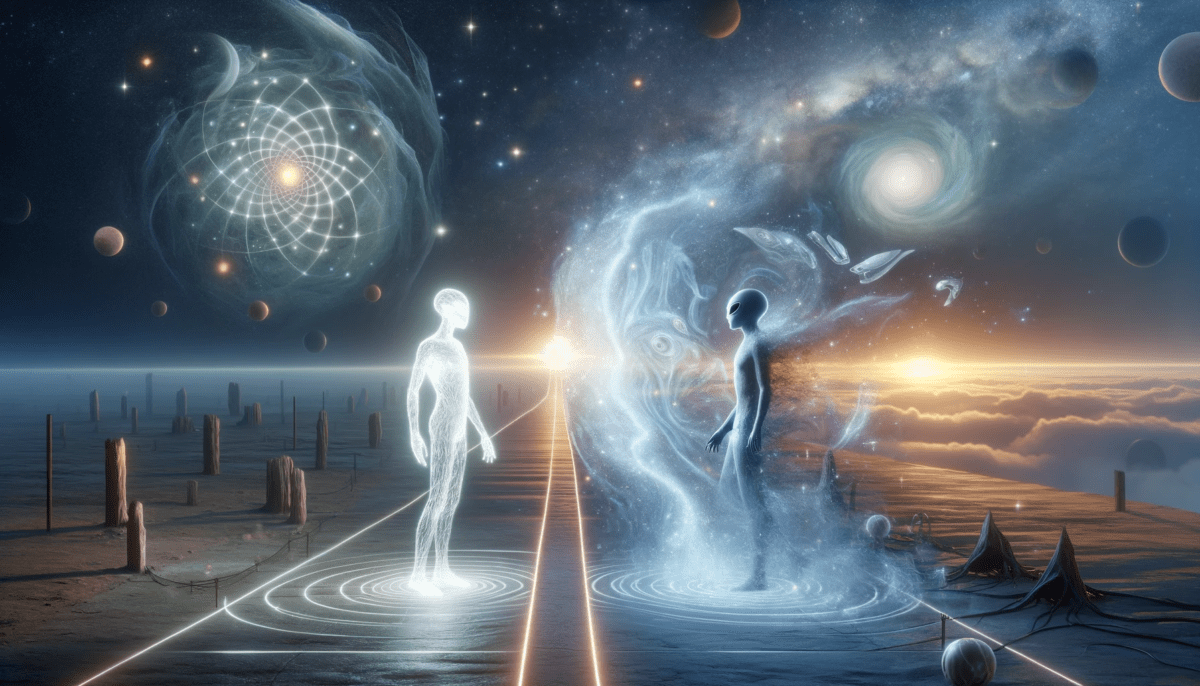
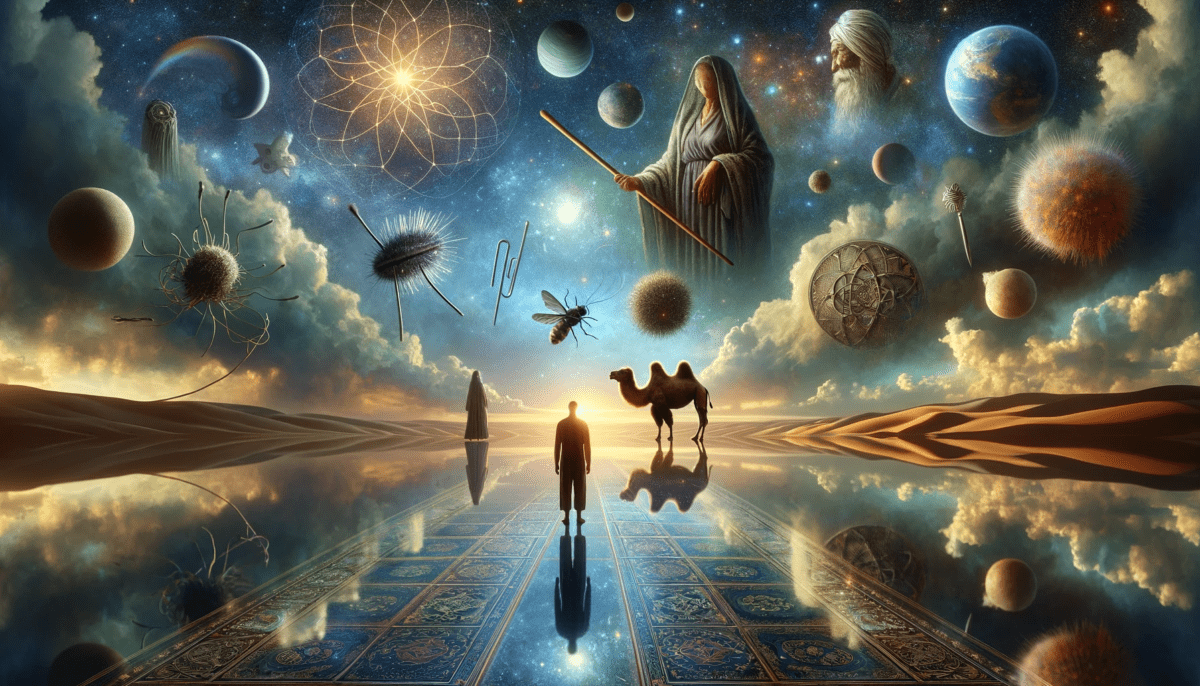
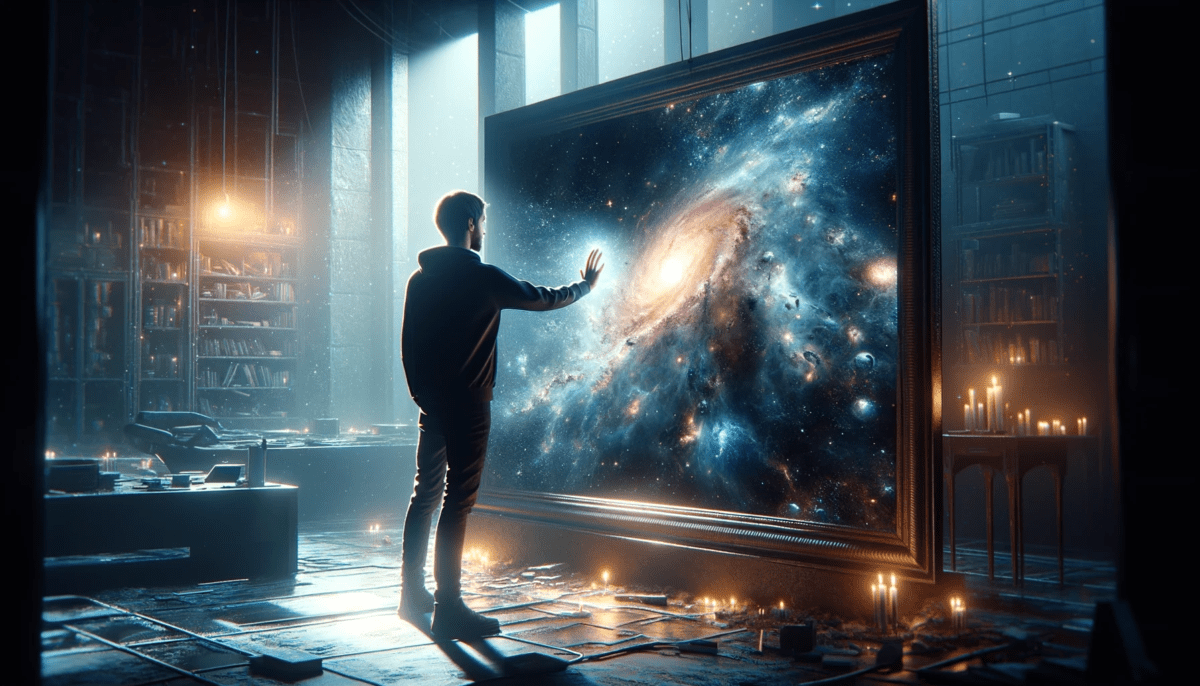

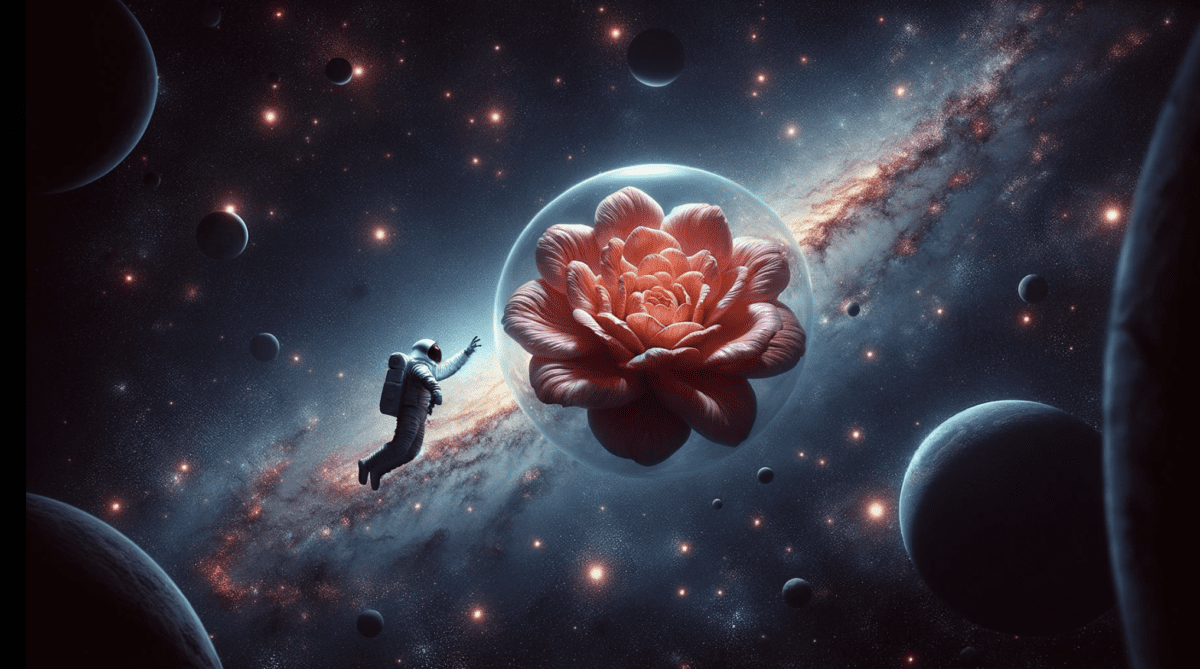
Leave a Reply